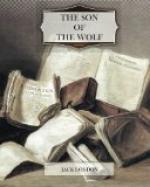‘Grace! You said you loved me?’ ‘I did.’ ‘And you do now?’ ’I do.’ ‘Say it again.’
‘I do love you, Clyde; I do.’ ‘There, you priest!’ he cried. ’You have heard it, and with those words on her lips you would send her back to live a lie and a hell with that man?’
But Father Roubeau whisked the woman into the inner room and closed the door. ‘No words!’ he whispered to Wharton, as he struck a casual posture on a stool. ‘Remember, for her sake,’ he added.
The room echoed to a rough knock at the door; the latch raised and Edwin Bentham stepped in.
‘Seen anything of my wife?’ he asked as soon as salutations had been exchanged.
Two heads nodded negatively.
‘I saw her tracks down from the cabin,’ he continued tentatively, ‘and they broke off, just opposite here, on the main trail.’ His listeners looked bored.
‘And I—I thought—’
‘She was here!’ thundered Wharton.
The priest silenced him with a look. ’Did you see her tracks leading up to this cabin, my son?’ Wily Father Roubeau—he had taken good care to obliterate them as he came up the same path an hour before.
‘I didn’t stop to look, I—’ His eyes rested suspiciously on the door to the other room, then interrogated the priest. The latter shook his head; but the doubt seemed to linger.
Father Roubeau breathed a swift, silent prayer, and rose to his feet. ‘If you doubt me, why—’ He made as though to open the door.
A priest could not lie. Edwin Bentham had heard this often, and believed it.
‘Of course not, Father,’ he interposed hurriedly. ’I was only wondering where my wife had gone, and thought maybe—I guess she’s up at Mrs. Stanton’s on French Gulch. Nice weather, isn’t it? Heard the news? Flour’s gone down to forty dollars a hundred, and they say the che-cha-quas are flocking down the river in droves.
‘But I must be going; so good-by.’ The door slammed, and from the window they watched him take his guest up French Gulch. A few weeks later, just after the June high-water, two men shot a canoe into mid-stream and made fast to a derelict pine. This tightened the painter and jerked the frail craft along as would a tow-boat. Father Roubeau had been directed to leave the Upper Country and return to his swarthy children at Minook. The white men had come among them, and they were devoting too little time to fishing, and too much to a certain deity whose transient habitat was in countless black bottles.
Malemute Kid also had business in the Lower Country, so they journeyed together.
But one, in all the Northland, knew the man Paul Roubeau, and that man was Malemute Kid. Before him alone did the priest cast off the sacerdotal garb and stand naked. And why not? These two men knew each other. Had they not shared the last morsel of fish, the last pinch of tobacco, the last and inmost thought, on the barren stretches of Bering Sea, in the heartbreaking mazes of the Great Delta, on the terrible winter journey from Point Barrow to the Porcupine? Father Roubeau puffed heavily at his trail-worn pipe, and gazed on the reddisked sun, poised somberly on the edge of the northern horizon.




